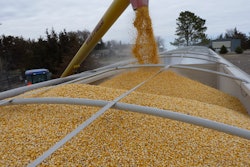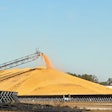
With another day comes another downward move in the commodity market. This fall’s harvest is projected to be large for many areas, but recent five-year lows in many commodity prices dampen a bit of the enthusiasm for the harvest season. After payment of operating notes and fall credit terms with suppliers, will there be anything left for the growers? Based on current prices, it appears that an increasing number of producers will be left with a significant loss, leaving lenders and input suppliers to pursue producers for repayment, depending, of course, on how well they protected their interests during the growing season.
Grain supplies should be ample this fall and basis trading opportunities plentiful for elevator locations with adequate storage. Grain originators shouldn’t get too comfortable, however, for the risks associated with procuring grain from a debt-saddled producer can be significant, particularly in the event of a rally in the grain markets. As grain moves in from the countryside, buyers must be mindful of possible scenarios that could put them at odds with a secured creditor. With producers and lenders facing a great deal of pressure to improve positions, grain traders should take care to verify the identity of the seller and source of each grain shipment and strictly adhere to lien search policies prior to payment.
Clear title states vs. notice states
Many grain buyers understand that the Food Security Act (FSA) of 1985 (found at 7 U.S.C. § 1631(e)) provides that buyers of farm products will take free-of-security interests created by sellers, unless the holders of those security interests comply with certain requirements. Under the FSA, states may be certified as “central filing states” or “clear title states” and those without a central filing system are commonly known as “notice states.” Unless a state’s central filing system has been certified by the USDA, the state is a notice state. To date, 19 states have been certified as clear title states for some or all farm products. The list is published on the USDA’s website at http://www.gipsa.usda.gov/laws/cleartitle.aspx. Minnesota and Nebraska are clear title states, for example, but Iowa and Kansas are not.
In clear title states with an approved central filing system, secured parties must file an “effective financing statement” covering their security interest in the state where the grain is produced. In notice states, a buyer of farm products, including grain, in the ordinary course of business takes free-of-security interests created by the seller, unless the secured parties have given the buyer notice of their security interests. It is common in notice states for producers to identify all of their potential grain buyers to their lenders.
Beyond merely perfecting their security interest, however, lenders in some circumstances have acted more aggressively to secure repayment by their farmer-borrowers. An elevator who contracts with a producer, whose inventory is subject to a lender’s security interest, may find itself at the lender’s mercy upon a rally in the commodities market. In fact, it is possible that the lender could encourage or cause the producer to breach its contract with the elevator in favor of another, higher-priced contract elsewhere.
Consider the following example:
In February, Frank Farmer borrows $500,000 in operating funds from Larry Lender, and grants Larry Lender a security interest in Frank Farmer’s crop. In March, Larry Lender mails out Food Security Act notices to area grain businesses, including Mary Merchandiser, letting them know that Larry Lender has a security interest in Frank Farmer’s crops. In June, Frank Farmer and Mary Merchandiser come to an agreement to price 50,000 bushels of new crop corn at $3.75/bushel for delivery to Mary Merchandiser in March of the following year, which would hopefully allow a small profit for Frank Farmer, assuming average yields.
Fall arrives and the crop is wet, and Frank incurs significant additional handling and drying expenses. It becomes clear that $3.75 is not going to cover his costs for the year. Near the end of harvest in early December, USDA issues a surprising report indicating that summer yield estimates were way off, and widespread disease and harvest weather issues have severely limited reported yields. The futures market adds $1.25/bushel to the nearby corn price over the course of a few weeks.
Larry Lender, concerned about year-end employee bonuses and collecting the loan balance, exercises his demand rights and calls the loan in mid-December. Using his security agreement as leverage, Larry Lender convinces Frank Farmer to sell the 50,000 bushels of corn to ABC Grain for $5.00/bushel, with payment jointly to Frank Farmer and Larry Lender.
Frank Farmer calls Mary Merchandiser and reports that Larry Lender forced his hand and there was nothing he could do to comply with Mary’s corn contract. Lacking the corn to apply to her forward contract, Mary Merchandiser closes her hedge position and is left with a -$1.25/bushel loss on her contract. She submits an arbitration claim against Frank Farmer, but he files bankruptcy just before Valentine’s Day. Mary contacts her attorney to evaluate her claims against Larry Lender.
In this example, the lender presumably relies on Uniform Commercial Code 9-315(a)(1) to claim it has a priority position over the grain and thus the right to dictate the manner in which it is sold, despite the grain elevator having issued a purchase contract for the grain and having entered into a hedge to offset its long position. Depending on the jurisdiction of the buyer and seller, the lender may very well have a superior lien position and the legal right to remarket the grain, though doing so in certain circumstances may expose the lender and the borrower to significant tort liability to the original grain purchaser.
Under the right circumstances, a lender with a superior lien position may, on the face of the documents, be technically able to resell and deliver title to the grain to another buyer and avoid the original contract between the borrower and the third-party bank. But exercising such steps may expose the lender to liability for substantial damages to the original seller for a number of different legal theories, including conversion, breach the duty of good faith and fair dealing, wrongful foreclosure or other claims. Lenders’ rights are not absolute, and each situation and applicable state laws should be reviewed in detail with competent counsel to evaluate the possible impacts of retaking collateral.
Conclusion
Merchandisers contracting with financed producers have some options in addressing these concerns, however. They can seek to obtain a waiver or a subordination agreement from lenders in advance of contracting significant bushels in order to secure the lender’s cooperation with the producer’s marketing decisions. Buyers can also attempt to establish their own security interest in the growing crops or grain inventory to protect their expectancy interest in receiving the grain and provide collateral for a substantial hedge position. Absent a waiver, merchandisers should understand that the lender may indeed be first in line, and could choose to force a defaulting borrower to avoid a forward contract and market the grain at a higher price to another elevator. Merchandisers should regularly communicate with growers and fully understand contracted positions and financial condition to avoid situations where producers are oversold or are nearing the end of their lines of credit with lenders.

















